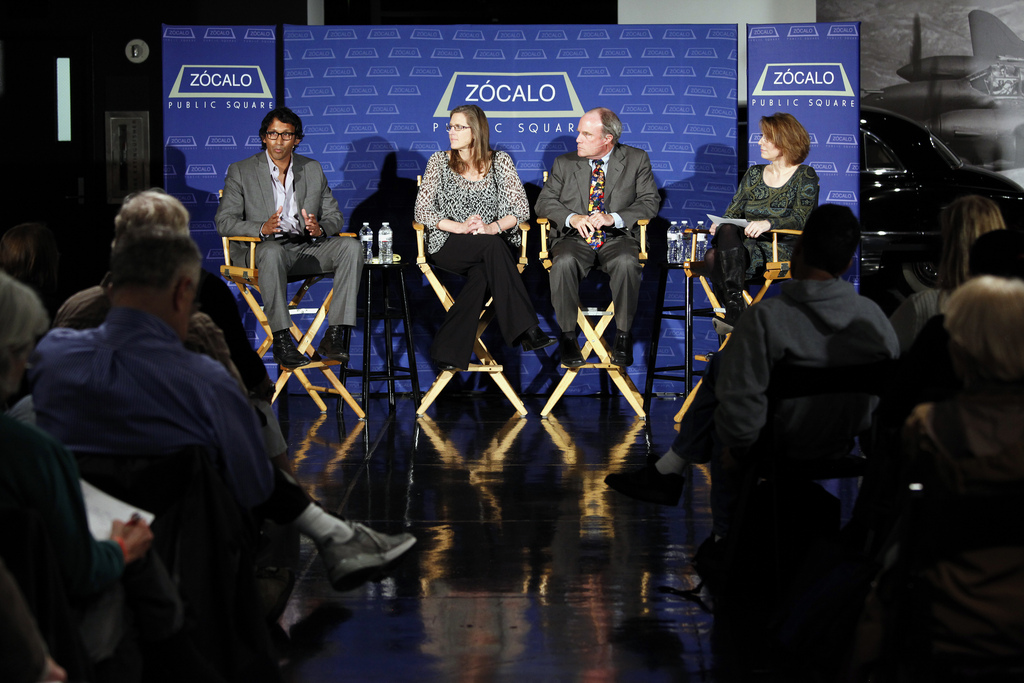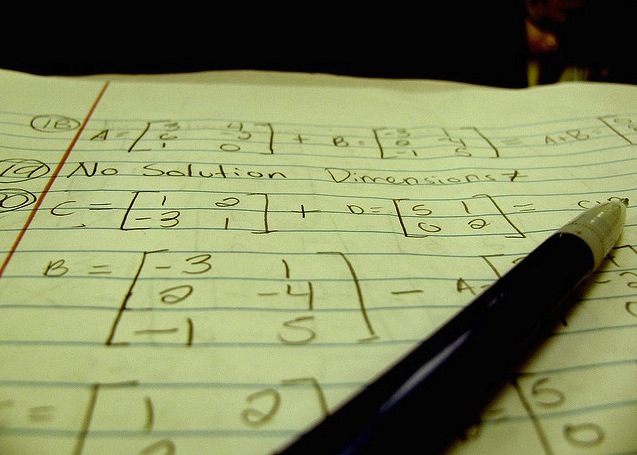
How much does math matter? In a New York Times op-ed last summer, political scientist Andrew Hacker suggested that the answer is not very much. Algebra, contended Hacker, isn’t necessary for all high school students—and it’s a barrier to graduation for some. Last night, at a Zócalo event at the Peterson Automotive Museum, a panel of people who work in and think about math education in America expressed a very different point of view.
The panel’s moderator, Jennifer Ouellette, author of The Calculus Diaries, opened the conversation by finding fault with American culture at large for its acceptance—often joking acceptance—of a widespread general lack of math skills. Is this attitude problematic—or is it evidence that these skills are unneeded?
Washington Post education columnist Jay Mathews, author of The War Against Dummy Math, said that he has no problem with adults not knowing high school or even middle school math; we tend to forget a lot of what we learned in history class as well. However, added Mathews, while early math offers us competence in a wide range of daily life situations, higher math can “energize and give more choices to people in our society” who come from disadvantaged backgrounds.
Panelist Caz Pereira, a workforce expert with the nonprofit Growth Sector, said that the low value we put on math skills is scary. Seventy-two percent of students enter college at only an eighth-grade math level—yet higher math skills can mean the difference between a $40,000-a-year job and a $70-80,000-a-year job. California alone is going to have thousands of engineering jobs to fill—and no one to fill them with. “If we’re not going to focus on math, we’re going to have a serious problem in the future,” he said.
But, asked Ouellette, since most students don’t plan to be engineers, why teach them a skill they aren’t going to use?
Mathews said that algebra teaches students to buckle down, to think about what they’re doing, and to work hard. Most American high schools don’t challenge students; algebra can get them into a habit of putting in time and effort that will serve them well later in life.
Orange County math teacher Sarah Armstrong—who stressed that she was offering her own views and not speaking for her district—said that algebra gives students the ability to stick with a problem until the end. And she disagreed with critics who claim most of us don’t use algebra; a lot of us, she said, use it every day but don’t know it. Calculating the rate of the price of gasoline is algebra, for instance—but because math is taught in a vacuum in our schools, we wouldn’t know it.
Pereira said that at the community college level, he’s encouraging schools and professors to teach math together with engineering—and to have schools make math more applied and connected to industry even earlier, at the high school level.
What about students who struggle with math?
Pereira said that we need to stop underestimating students, start engaging them in the curriculum, and make them understand the future opportunities math skills offer.
Armstrong said that we need to offer remedial help to struggling math students much earlier; kids who can’t read are identified in the first grade, but math remediation doesn’t start until fourth or fifth grade—at the earliest.
“In inner-city schools that have succeeded,” said Mathews, “you see math as a low-hanging fruit.” Because math, unlike reading, is taught almost exclusively in schools, teachers have a lot of influence on their students—and at the leading inner-city schools, like the KIPP charter schools, math scores go up faster than reading scores. “This is something we should be able to do at every school,” he said.
Ouellette asked the panelists if they’ve seen proof that algebra causes students to drop out of schools.
None of the data backs that up, said Mathews. More and more states are making algebra a requirement for high school graduation, yet the nation has fewer dropouts today than we have in a long time.
Armstrong is excited about the new Common Core curriculum standards California is adopting, which will no longer require eighth graders to take Algebra 1. Many of her students weren’t ready for the class, and she thinks this will help them get a stronger foundation before entering high school.
In the question-and-answer session, the panelists talked about the uses of math beyond the classroom and the role of technology in teaching the subject.
How, asked an audience member, does math help you understand life?
Math can give a sense of the moral, said Mathews.
Armstrong called math “the alphabet of science,” and Pereira concurred, pointing to the landing of the Mars rover as one example of how the two subjects work in concert.
Ouellette said that math also is crucial to reasoning. Even if you’re not using differential equations in your job, you’re using the math skill of framing problems in order to solve them.
Are computers in classrooms changing the way math is taught?
Mathews said that, so far, there’s no data to show that teaching computers makes students better at anything than using a computer. And, added Armstrong, on a practical level, most schools, including her own, don’t have the computer access or resources to meet students’ needs.






Send A Letter To the Editors